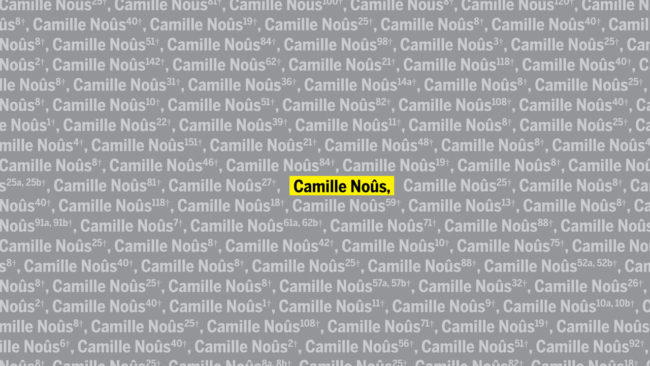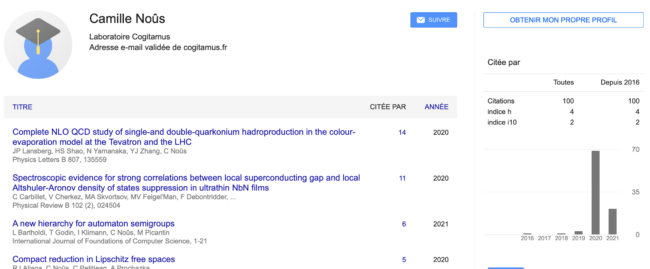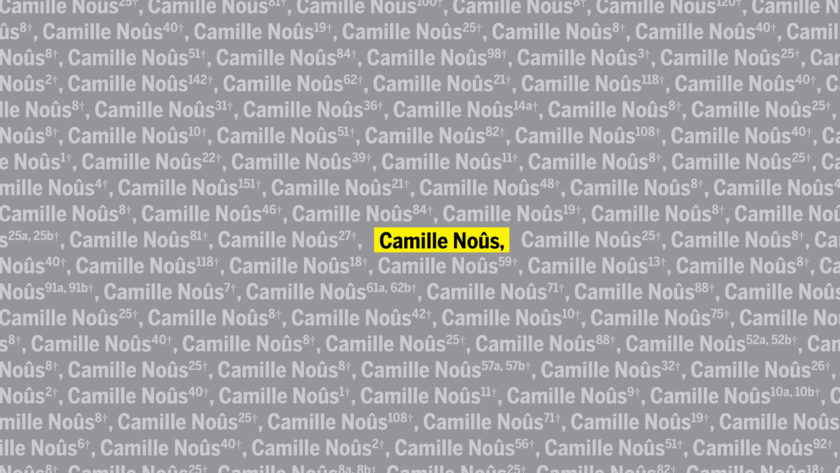
Camille Noûs has published almost 200 research papers. Via Google scholar you discover that it is all very noteworthy research that is being cited by others …

Her papers are not only top quality papers, but they are also spread across a very wide field – astrophysics, molecular biology, and ecology.
Is all this work the product of a true genius?
Actually no.
The one truly fascinating insight is that Camille Noûs is not a real person, she does not actually exist at all.
Is there something dubious going on?
Nope, the explanation lies elsewhere. There is an article in Science that explains what has been going on. There they reveal …
The name—intentionally added to papers, sometimes without the knowledge of journal editors—is meant to personify collective efforts in science and to protest individualism, according to RogueESR, a French research advocacy group that dreamed up the character ….
… RogueESR has spent the past year protesting a French research reform law that introduced new types of temporary research jobs. The group, which has no formal leader, says the changes threaten academic freedom and job security, and that the law’s focus on metric-based research evaluation—such as numbers of publications or citations—emphasizes individual accomplishment too much and is damaging to the research culture….
Why that specific name?
In a French cultural context, the name Camille is both gender neutral and also associated with political protest. The surname Noûs, is a play on the French nous, meaning “we,” and the ancient Greek νοῦς, meaning reason.
There are Problems here?
I get where they are coming from, but others have pointed out that doing this opens a huge can of worms …
…But the idea runs into dangerous ethical territory, Rasmussen says: Responsibility and accountability must accompany the credit that comes with authorship, she says, and in the case of Noûs, no one can take on those burdens. RogueESR says Noûs would withdraw from any paper with a breach of integrity (via the secretaries managing the email account). But as Noûs grows, RogueESR might lose control of the brand, Rasmussen says. “At a certain point, if it does grow beyond them, who’s yanking Camille Noûs’s name?”
Others are on board with it all …
Here is one guy who used her name, so when asked, he will of course defend what he did and yet there have also been consequences …
…Jean-Philippe Lansberg, a physicist at CNRS, the French national research agency, says the name is “an elegant and harmless way of protesting.” Lansberg, who included Noûs on a paper in Physics Letters B—the most highly cited of Noûs’s work to date—thinks Noûs serves as a kind of sting operation to expose the weaknesses in authorship conventions. In high-energy physics, long author lists make it impossible for everyone to meaningfully take responsibility for the research. Noûs shows these authorship standards, and the metrics that draw on them, are impoverished and absurd, he says.
Some authors, like Lansberg, did not inform editors that Noûs is not a real person. A spokesperson for Scientific Reports told Science that “concerns have been raised” about authorship on a paper in the journal that lists Noûs, and the journal is investigating. And a paper in Physical Review B has published a correction stating that the inclusion of Noûs’s name was contrary to journal policy, and that it had been removed.
This potential for corrections raises another problem, Rasmussen says: Students or early-career researchers who go along with senior authors’ enthusiasm for Noûs might face a correction or even retraction. “That’s going to be with them for the rest of their career,” she says.
Transparency?
RogueESR has in turn started being wholly transparent with journal editors about the meaning behind the name.
French based journal editors, aware of impact of the French research Reform Law, get it, and happily go along with it. Editors on international journals are pushing back …
a group of mathematicians committed to the idea of Noûs chose to withdraw a paper from consideration at the Proceedings of the Royal Society of Edinburgh Section A after the editorial board decided Noûs could not be included. In another case, an editor at Solar Physics declined to allow the submission of Noûs papers, citing the authorship standards recommended by the Committee on Publication Ethics, which require every author to make substantial contributions to the work and to take responsibility for its contents.
What next for all of this?
With no international traction for this, I suspect it will remain a distinctly French protest restricted to French journals and that in the long term it will eventually fizzle out.
The Article in Science that spells it all out is a big bold flashing neon sign that effectively announces to all journal editors, or at least those that read Science, to keep an eye out for that name and to reject articles that cite the name. Alternatively, if already published, to perhaps issue a correction.
Quantum interactions
One of the most bizarre premises of quantum theory, which has long fascinated philosophers and physicists alike, states that by the very act of watching, the observer affects the observed reality. In this case making the observation about all of this by publishing the details in Science is most probably going to do exactly that.
Camille Noûs – Further Reading
- Science (Mar 16, 2021) – Who is Camille Noûs, the fictitious French researcher with nearly 200 papers?
